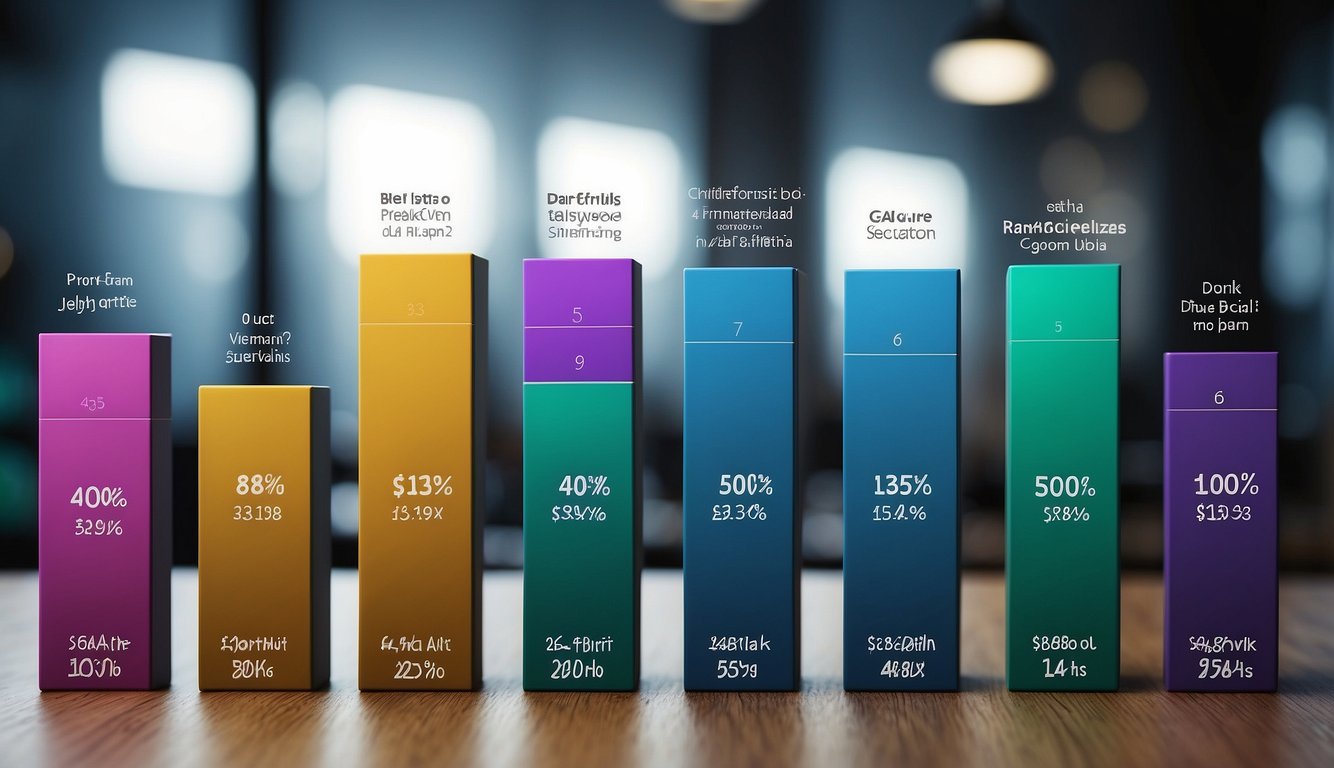
If you’re considering moving to Singapore for work, one of the first questions you may ask is, “What is the average salary in Singapore?”
This is an important question, as it will help you understand how much you can expect to earn. And how far your money will go in this city-state.
In this article, we’ll explore the average salary in Singapore. And some of the factors that influence wages in this country.
Singapore is known for its high cost of living, but it’s also known for its high salaries. According to the latest data from the Ministry of Manpower, the median monthly income for full-time employed residents in Singapore was S$4,563 in 2022. This was an increase from S$4,500 in 2021. However, it’s important to note that this is just a median figure, and salaries can vary widely depending on a number of factors, such as your industry, job title, experience, and education level.
In the following sections, we’ll take a closer look at some of the factors that influence salaries in Singapore, as well as some tips for negotiating your salary and understanding your employee benefits. By the end of this article, you should have a better understanding of what you can expect to earn in Singapore and how to make the most of your salary.
Key Takeaways
- The median monthly income for full-time employed residents in Singapore was S$4,563 in 2022.
- Salaries in Singapore can vary widely depending on factors such as industry, job title, experience, and education level.
- Understanding employee benefits and negotiating your salary can help you make the most of your earnings in Singapore.
Overview of Salaries in Singapore

If you are planning to work in Singapore, it is essential to understand the average salary in Singapore. In this section, we will provide you with an overview of salaries in Singapore. It includes the national average, median salary, and salary trends over time.
Understanding Average Salary
According to MintSalary, the average salary in Singapore in 2023 is around USD 60,600 per year. However, it is essential to note that this figure varies depending on several factors. These are the job industry, experience, and education.
Median Salary Insights
For full-time employed Singapore residents, the median gross monthly income from work, including employer CPF contributions, is S$4,563, according to ResumeWriter. This figure is slightly higher than the median gross monthly salary for full-time permanent jobs. It was found to be $3,800 in 2021, according to a survey of 11,200 graduates conducted by MyCareersFuture.
Salary Trends Over Time
As per the Michael Page Salary Guide 2023, the average salary in Singapore has been increasing over the years. It’s with an average salary increase of 10-15% when switching jobs. The Jobstreet Salary Report 2022 also revealed that 41 industries in Singapore had increased gross salaries since the previous year.
In conclusion, the average salary in Singapore is competitive and varies depending on several factors. These are job industry, experience, and education. Understanding the median wage and salary trends over time can also provide insights into the job market in Singapore.
Factors Influencing Salaries

When it comes to determining your salary in Singapore, there are several factors that come into play. Here are some of the key factors that can influence your salary:
Industry and Profession
The industry and profession you work in can have a significant impact on your salary. For example, the finance and technology industries tend to offer higher wages than other industries. Similarly, professionals such as doctors, lawyers, and engineers tend to earn higher salaries compared to other professions.
Education and Qualifications
Your level of education and qualifications can also play a role in determining your salary. Generally speaking, the higher your level of education and the more stuff you have, the higher your salary is likely to be. For example, a master’s degree is expected to earn more than a bachelor’s degree.
Experience and Job Title
Experience and job title are also important factors that can influence your salary. Generally speaking, the more experience you have in a particular field, the higher your salary will likely be. Similarly, higher job titles such as manager or director come with higher wages than entry-level positions.
Age and Gender
Unfortunately, age and gender can also play a role in determining your salary. Studies have shown that older workers tend to earn more compared to younger workers, while men tend to earn more compared to women. However, it’s important to note that these factors should not be the sole determinants of your salary, and that all workers should be paid fairly and equally regardless of their age or gender.
Overall, there are several factors that can influence your salary in Singapore. By understanding these factors and working towards improving your qualifications, experience and job title, you can increase your chances of earning a higher salary in your chosen profession or industry.
Salary Breakdown

If you are curious about the average salary in Singapore, it’s important to understand how salaries are structured. Here’s a breakdown of the different components that make up a typical salary in Singapore.
Basic Wages and Gross Salary
Your basic wage is the amount you earn before any deductions or additional earnings are added. Your gross salary, on the other hand, is your total earnings before any taxes or other deductions are taken out. In Singapore, your gross salary includes both your basic wage and any additional earnings you may receive.
CPF Contributions
CPF stands for Central Provident Fund, which is Singapore’s national social security savings plan. Both employers and employees are required to contribute a portion of their salaries to CPF. The employer contribution is 17% of the employee’s gross salary, while the employee contribution is 20% of their gross salary.
Additional Earnings
Additional earnings can include things like overtime pay, tips, commissions, and other allowances. One-twelfth of annual bonuses is also typically included in an employee’s monthly salary.
It’s important to note that the average salary in Singapore can vary widely depending on factors such as industry, experience, and education. However, by understanding the different components that make up a typical salary, you can get a better idea of how salaries are structured in Singapore.
Earnings by Sector

If you’re curious about the average salary in Singapore, it’s important to know that earnings can vary widely depending on the sector you work in. Here are some of the most lucrative sectors to work in, along with their average salaries:
Finance and Banking
If you have a background in finance or banking, you might be interested in pursuing a career in Singapore’s financial sector. According to Salary Guide Singapore 2023, the finance and banking industry is one of the highest paying sectors in the country. The average salary for a finance professional in Singapore is around £95,000 per year.
Information Technology
If you’re a software engineer or have experience in the IT industry, you’ll be happy to know that Singapore’s tech sector is booming. According to the Singapore Yearbook Of Manpower Statistics 2023, the average salary for an IT professional in Singapore is around £85,000 per year.
Health and Medicine
If you have a background in health or medicine, you might be interested in pursuing a career in Singapore’s healthcare sector. According to the Singapore Yearbook Of Manpower Statistics 2023, the average salary for a healthcare professional in Singapore is around £70,000 per year.
Sales and Marketing
If you’re a sales or marketing professional, you’ll be happy to know that Singapore’s marketing and advertising sector is growing rapidly. According to Salary Guide Singapore 2023, the average salary for a sales or marketing professional in Singapore is around £75,000 per year.
Education and Training
If you have a background in education or training, you might be interested in pursuing a career in Singapore’s education sector. According to the Singapore Yearbook Of Manpower Statistics 2023, the average salary for an education professional in Singapore is around £60,000 per year.
Overall, there are many lucrative sectors to work in if you’re interested in pursuing a career in Singapore. Whether you have a background in finance, banking, software engineering, health, sales, marketing, education, or other professions, you’re sure to find a sector that suits your skills and interests.
Understanding Employee Benefits

Mandatory Benefits
When working in Singapore, you are entitled to mandatory benefits such as Central Provident Fund (CPF) contributions. Both you and your employer are required to contribute to your CPF account, which goes towards your retirement savings, housing, and healthcare. The CPF contribution rates are based on your age and total monthly wages. It’s important to understand the CPF contribution rates for your specific situation to ensure compliance and maximise your benefits.
Common Perks and Allowances
In addition to mandatory benefits, many companies in Singapore offer common perks and allowances to attract and retain talent. These may include bonuses, medical insurance coverage, transportation allowances, and various other employee welfare schemes. Understanding the perks and allowances offered by your employer can give you a clearer picture of your overall compensation package and help you make informed decisions about your financial planning.
By understanding the mandatory benefits and common perks and allowances in Singapore, you can gain a comprehensive understanding of the total rewards associated with your employment. This knowledge empowers you to make informed decisions about your career and financial well-being.
The Role of HR and Compliance

Salary Guide and Pay Scales
If you are working in HR or Compliance in Singapore, you will want to know what the average salary is for your role. A salary guide can help you determine what the average salary is for your job title and level of experience. This can be especially helpful if you are negotiating a salary with a new employer or seeking a raise with your current employer.
The average salary for a Compliance Officer in Singapore is S$54,271 in 2023. However, the salary range can vary greatly depending on your level of experience, with a base pay range of $4K – $6K / month.
Ensuring Competitive Compensation
As an HR or Compliance professional, it is important to ensure that your company is offering competitive compensation packages to attract and retain top talent. This includes not just salary, but also benefits such as health insurance, retirement plans, and bonuses.
Compliance professionals in Singapore are in high demand due to the increasing focus on regulatory compliance and risk management. This means that companies may need to offer more competitive compensation packages to attract and retain top talent in this field.
Ensuring that your company offers competitive compensation packages can help you attract and retain top talent, which can ultimately lead to increased productivity and profitability. It can also help you maintain a positive company culture and reputation.
In conclusion, as an HR or Compliance professional in Singapore, it is important to stay up-to-date on salary trends and ensure that your company is offering competitive compensation packages to attract and retain top talent. A salary guide can be a helpful tool in determining what the average salary is for your job title and level of experience, and can help you negotiate a fair salary with your employer.
Labour Market Trends

If you’re curious about the average salary in Singapore, it’s important to understand the current labour market trends. The following subsections will provide insight into the hiring and talent landscape, as well as upskilling and career progression opportunities.
Hiring and Talent Landscape
The hiring landscape in Singapore is competitive, with a high demand for skilled workers in various industries. The labour force is made up of both local and foreign workers, with the latter being an essential part of the workforce. According to the Ministry of Manpower, the unemployment rate in Singapore is currently at 2.0% as of September 2023. This indicates that there are employment opportunities available for jobseekers.
Employers in Singapore are also focused on attracting and retaining top talent. This has led to an increase in employee benefits and perks, such as flexible working arrangements, health and wellness programmes, and training and development opportunities. Employers are also offering higher salaries and bonuses to attract the best candidates.
Upskilling and Career Progression
The talent landscape in Singapore is constantly evolving, and employers are looking for workers who are willing to upskill and adapt to new technologies and trends. Upskilling opportunities are available through various programmes and initiatives, such as SkillsFuture and the Adapt and Grow initiative.
Career progression is also a key focus for employees in Singapore. Workers are encouraged to take on new challenges and responsibilities, and to continuously develop their skills and knowledge. This can lead to promotions and salary increases, as well as opportunities to move into different roles or industries.
Overall, the labour market trends in Singapore are exciting for both jobseekers and employees. With a focus on hiring and talent development, as well as upskilling and career progression, there are opportunities for growth and advancement in various industries.
Cost of Living and Salary Comparison

Cost of Living in Singapore
If you’re planning to live and work in Singapore, it’s important to know the cost of living in the city-state. According to Numbeo, the cost of living in Singapore is relatively high, with a family of four estimated to spend around S$5,482.5 per month without rent. A single person, on the other hand, can expect to spend around S$1,520.1 per month without rent.
The cost of living in Singapore includes expenses such as food, utilities, transportation, and housing. Food and beverages can be relatively expensive, especially if you dine out frequently. However, if you cook at home, you can save money on food expenses. Utilities, such as electricity and water, are generally affordable, but air conditioning can drive up your electricity bill. Transportation costs can also add up, especially if you own a car. However, Singapore has an efficient public transportation system, which can help you save money on transportation costs.
International Salary Comparison
When it comes to salary, Singapore offers relatively high pay compared to other countries. According to Time Doctor, the average salary in Singapore in 2023 is around S$8,450 per month. This salary is higher than the average salary in many other countries, including the United States, the United Kingdom, and Australia.
However, it’s important to note that the cost of living in Singapore is also relatively high. Therefore, it’s important to consider the cost of living when comparing salaries. According to AsiaOne, the median monthly income per household in Singapore in 2021 was S$9,520. This income can provide a comfortable living in Singapore, but it’s important to manage your expenses wisely to make the most of your salary.
When negotiating your salary in Singapore, it’s important to research the market salary for your position and industry. This can help you determine a reasonable salary range and negotiate effectively with your employer.
Negotiating Salaries

Negotiating salaries can be a daunting task, but it is an important step towards getting the salary you deserve. Understanding salary packages and evaluating job offers can help you negotiate a better salary.
Understanding Salary Packages
When negotiating your salary, it is important to understand the components of your salary package. Your salary package may include basic salary, bonuses, benefits, and allowances. Basic salary is the fixed amount of money you receive each month. Bonuses are additional payments made to you based on your performance or the company’s performance. Benefits may include health insurance, retirement plans, and paid time off. Allowances may include transportation, housing, and meal allowances.
When negotiating your salary, you should consider all the components of your salary package. If you are not satisfied with the basic salary, you may negotiate for a higher bonus or better benefits.
Evaluating Job Offers
When evaluating a job offer, it is important to consider the entire compensation package, not just the salary. You should consider the benefits, bonuses, and allowances offered by the company. You should also consider the job responsibilities, company culture, and opportunities for growth and advancement.
Before accepting a job offer, you should also consider your expected salary and salary expectations. Your expected salary is the salary you believe you deserve based on your skills, experience, and qualifications. Your salary expectations are the salary range you are willing to accept.
When negotiating your salary, it is important to be confident and assertive. You should be prepared to explain why you deserve a higher salary and provide evidence to support your claim. You should also be willing to compromise and negotiate a salary that is fair for both you and the company.
Remember, negotiating your salary is an important step towards building your career and achieving financial stability. With the right preparation and mindset, you can negotiate a salary that reflects your worth and helps you achieve your goals.
Employment Policies and Legislation

If you are planning to work in Singapore, it is important to be aware of the various employment policies and legislation that govern the labour market. In this section, we will provide an overview of the minimum wage regulations and income tax compliance requirements in Singapore.
Minimum Wage Regulations
Unlike many other countries, Singapore does not have a minimum wage policy. Instead, the government encourages employers to voluntarily adopt the Tripartite Guidelines on Fair Employment Practices, which includes recommendations on fair wages and benefits. The National Wages Council (NWC) also issues annual guidelines on wage increases for low-wage workers. These guidelines are not legally binding, but many employers follow them as a benchmark for wage adjustments.
Income Tax and Compliance
If you are working in Singapore, you will be subject to personal income tax. The tax rates are progressive and range from 0% to 22%, depending on your level of income. The tax year in Singapore is from 1 January to 31 December, and you are required to file your tax return by 15 April of the following year.
To ensure compliance with income tax regulations, your employer is required to withhold a portion of your salary each month and remit it to the Inland Revenue Authority of Singapore (IRAS). Your employer will also issue you a Form IR8A at the end of the tax year, which you will need to use to file your tax return.
The Ministry of Manpower (MOM) is the government agency responsible for regulating the labour market in Singapore. MOM oversees issues related to employment contracts, working hours, leave entitlements, and other employment-related matters. If you have any questions or concerns about your employment rights, you can contact MOM for assistance.
In conclusion, while Singapore does not have a minimum wage policy, the government encourages employers to adopt fair employment practices, and the NWC issues annual guidelines on wage increases for low-wage workers. Personal income tax is also a requirement for all workers in Singapore, and compliance with tax regulations is overseen by the IRAS. MOM is the government agency responsible for regulating the labour market, and you can contact them for assistance with any employment-related matters.
Frequently Asked Questions

How much do Singaporeans typically earn each year?
If you’re curious about the average salary in Singapore, you’ll be pleased to know that the average monthly salary in Singapore is around S$5,783, according to Morgan McKinley. This equates to an annual salary of S$69,396. However, it’s important to note that this is just an average, and salaries can vary significantly depending on the industry, job role, and level of experience.
What’s the buzz about top earning industries in Singapore?
According to the Ultimate Singapore Average Salary Guide, the top earning industries in Singapore include finance, technology, healthcare, and legal services. These industries offer some of the highest salaries in the country, with finance professionals earning an average of S$9,000 per month and technology professionals earning an average of S$6,500 per month.
Curious about a smashing salary at 30 in Singapore?
If you’re in your 30s and wondering what kind of salary you can expect in Singapore, you’ll be pleased to know that this can vary depending on your job role and industry. According to FastJobs, the median salary for professionals in their 30s ranges from S$5,000 to S$7,000 per month. However, it’s important to note that this is just a rough estimate, and salaries can vary significantly depending on your level of experience, qualifications, and job role.
What’s the scoop on high-flying incomes in Singapore?
If you’re looking for a high-flying income in Singapore, you’ll need to have the right skills, qualifications, and experience. According to Morgan McKinley, some of the highest paying jobs in Singapore include investment bankers, lawyers, and management consultants. These professionals can earn upwards of S$20,000 per month, depending on their level of experience and the company they work for.
Is $4000 a month a fabulous salary in Singapore?
Whether a salary of S$4,000 per month is fabulous or not depends on your lifestyle, living expenses, and personal circumstances. According to SingSaver, the median salary in Singapore is around S$6,254 per month, including CPF contributions from employers. However, it’s important to note that this is just an average, and salaries can vary significantly depending on your industry, job role, and level of experience.
How do your earnings stack up in Singapore’s salary landscape?
If you’re curious about how your earnings stack up against the rest of Singapore’s salary landscape, you can use online tools such as Salary.sg, Payscale, and Glassdoor to compare your salary to others in your industry and job role. However, it’s important to remember that these tools provide estimates and should be used as a rough guide only.

